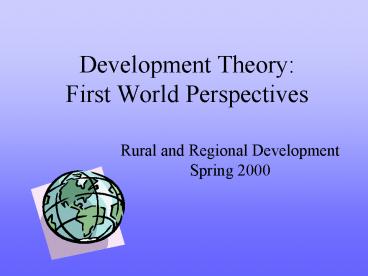Development Theory: First World Perspectives PowerPoint PPT Presentation
1 / 19
Title: Development Theory: First World Perspectives
1
Development Theory First World Perspectives
- Rural and Regional Development Spring 2000
2
Explaining Different Levels of Development
- Introduction
- Evolution of Development Theory
- A. Classical Economics
- 20th Century Approaches to Development
- A. Modernization Theory
- B. The Marginalist School
- C. Dualism and Core-Periphery/Imperialism
- D. Neoliberalism and Sustainable Development
- Development Theories in Practice
- (the World Bank and IMF)
3
I. Introduction to Development Theory
- Explaining global patterns of development
- Socio-economic indicators
- Institutional and structural inequalities
- History of under/development
- Contemporary implications
- World Bank, International Monetary Fund (IMF),
- US Agency for International Development (USAID)
4
First World Perspectives on Development
- Geographically rooted experiences
- European and American-based theories
- Attempting to modernize the world according to
Western experience (diffusion)
- Basic Assumptions
- Attempt to eliminate geographic differences in
development - 3rd world should follow the knowledge and
practice of 1st world - Problems in 3rd world due to economic issues,
e.g. poverty, and cultural inferiority
5
II. Evolution of Diffusionist Theory
- Pre-Industrial Europe
- Mercantilism (16th-18th C.)
- Monetary wealth from trade
- Positive monetary trade balance
- Shift with agricultural advances
6
Classical Economics and Development
- Industrial Revolution
- Focus on production as economic base of society
- Adam Smith
- The Wealth of Nations
- Thomas Malthus
- Population growth and resource limitations
7
Classical Economists (cont.)
- Ricardo
- Growth with industrialization
- More surplus devoted to exploiting resources,
greater inefficiency - Trade and specialization support growth
8
Marxian economics and international development
- Capitalist Mode of Production
- MOP - production relations (technology, means of
prod.) and social relations (owners of means of
prod. and labor) - Development of stages of economic formation
- Capitalist accumulation
- Labor value and corporate profits
- Geographic expansion and technological
improvements - Inherent contradictions with overaccumulation and
crisis
9
Modes of Production(with particular production
and social relations)
communism
socialism
capitalism
feudalism
Slavery
10
III. 20th Century Development Theories
- What are some of the differences in the 19th and
20th centuries that would affect international
development? - Mass production, technology, increased global
trade, divisions of labor
11
A. Modernization theorists
- Walt Rostow
- A Non-Communist Manifesto (1960)
- Development from backward to advanced level
- Stages of development
- Traditional
- Pre-conditions for takeoff
- Takeoff
- Drive to maturity
- Age of high mass consumption
- Beyond mass comsumption
12
Modernization Theorists (cont.)
- Parsons structural-functional theory of society
- Structure of society formed pattern variables in
which decisions are made - Individual decisions consistent with needs of
society - Modern societies have greater divisions of labor
and more competitive capitalist system of
production
- Critiques of modernization theory
- Lack of explanation of how first world societies
experience initial change - Based on historical observation without adequate
integration of current conditions
13
B. The Marginalist School (neoclassical
economics)
- Shift from focus on production in unlimited
quantities to restrictions and limitations on
production - price (value) of a good based on marginal utility
or availability of good - Scarcity drives price up, abundance drives price
down - Focus on exchange versus production
14
B. The Marginalist School (cont.)
- Assumptions concerning economic growth
- 1. Economic production represented by production
function - - factors of production (labor, capital, and
technological knowledge - 2. Land and labor fully employed
- 3. Wages linked to increased output of goods
from additional labor input - 4. Greater availability of production factor,
the lower its price
15
Marginalist School and international development
- Open/free market forces in world economy
- Comparative advantage
- (specialization where production factors most
abundant) - E.g. Kenyan tea and British ships
- International labor mobility to equalize wage
rates - Free capitalist competition
- 3rd World poverty
- (? population growth, lack of education and
technical know-how, lack of domestic savings)
16
C. Dualism (Core-Periphery)
- Modern and traditional sectors in society
- Capitalist production with modern technologies
- Subsistence wages and surplus of labor
(inefficient) - Geographic applications in 1st and 3rd world
regions - Cumulative causation (backwash effect)
- Capitalism via imperialism necessary
- improves economic welfare
17
D. Neoliberalism
- Revival of marginalist and modernization theory
- Growing influence of World Bank and IMF
- Debt relief and structural adjustment programs
- Diffusionist, but recognizes more than one path
to development - Supports public sector and public-private
enterprises
18
and Sustainable Development
- Gro Brundtland
- Our Common Future (1987)
- development which meets the needs of the present
without compromising the ability of future
generations to meet their own needs - - environmental and social concerns
19
Summary of 1st World Development Theories
- Introduction
- Diffusionist views with 1st world as model of
development - Evolution of Development Theory
- Classical economics
- Unlimited production and free trade
- Capitalist MOP
- III. 20th Century Approaches to Development
- A.Modernization Theory
- B.The Marginalist School
- C. Dualism and Core-Periphery/Imperialism
- D. Neoliberalism and Sustainable Development
- IV. Development Theories in Practice
- - the World Bank and IMF

